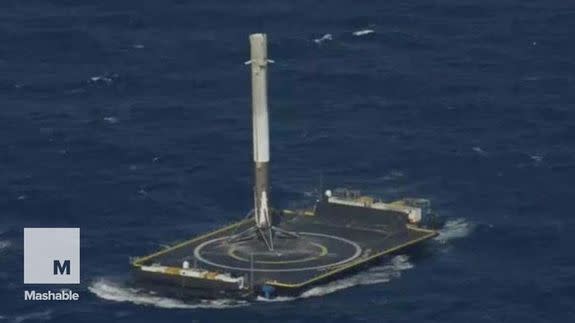Elon Musk's SpaceX has chosen a rocket for its first true reusability test

SpaceX has long had the goal of creating a fleet of reusable rockets that can fly multiple payloads to orbit and then land back on Earth, greatly reducing the cost of launching to space.
Elon Musk's spaceflight company has already brought multiple rockets back from space after launches, but they have yet to re-fly a booster, a major component of their business plan.
That should change by the end of the year.
SEE ALSO: SpaceX aims to relaunch a used Falcon 9 rocket as early as September
According to Musk, the company is planning to refurbish a landed rocket and fly it on another mission in September or October, a first for the spaceflight company. And we now know which landed Falcon 9 booster they're planning to use for the company's historic re-flight.
SpaceX is planning to fly a booster that landed on a drone ship in the ocean on April 8, Hans Koenigsmann, SpaceX's vice president of flight reliability, said during a press conference Saturday. (It's still unclear, however, which mission will fly aboard the rocket.)
This was the first booster to successfully land on a drone ship intact after four previously failed attempts.
The April landing marked the second time SpaceX brought a booster back down to Earth. In December 2015, the company landed a Falcon 9 booster back on land in Florida after successfully launching a clutch of satellites to orbit.
That first booster may not fly again, if Musk has anything to say about it.
"I think we'll probably keep this one on the ground just because it's kind of unique, it's the first one we brought back," he said after the December landing. "So I think we'll probably keep this one on the ground."

Image: SpaceX
SpaceX's goal to reduce the cost of spaceflight, thereby opening up outer space to many more people and companies, hinges on the idea that reusable rockets could be a viable option.
Musk's company isn't the only one banking on this notion.
Jeff Bezos' spaceflight outfit Blue Origin is also hoping to use reusable rockets for orbital and suborbital missions in the future. Blue Origin has already flown and landed a suborbital rocket four times.
Currently, SpaceX has landed four boosters back on Earth after sending payloads to orbit, but that could change shortly.
SpaceX will attempt another land landing in Florida after launching an un-crewed Dragon spacecraft to the International Space Station for NASA on Monday.
